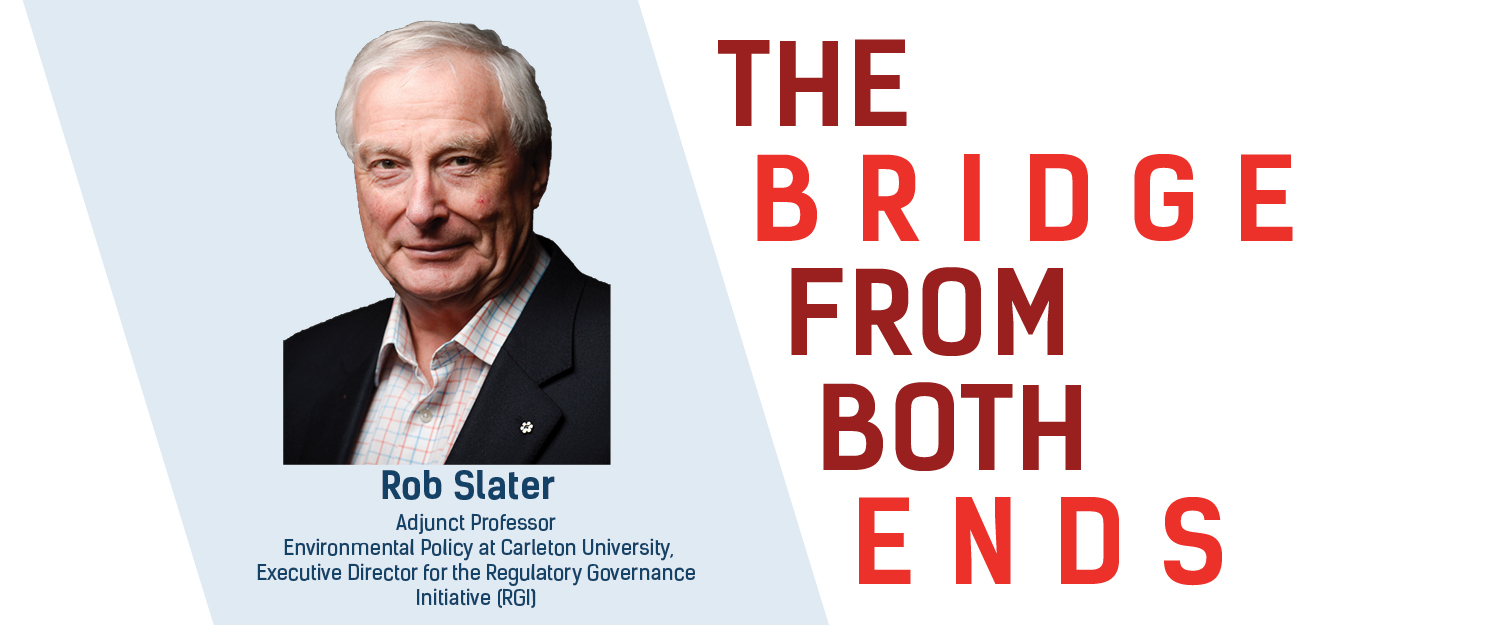The Bridge from Both Ends

Author(s):
Rob Slater
Carleton University
Adjunct Professor, Environmental Policy
Regulatory Governance Initiative (RGI)
Executive Director
Canadian Science Policy Center
CSPC Lifetime Achievement Award Winner 2020
Last year, the CSPC recognised me with a lifetime achievement award. That was a delightful surprise and prompted me to think about what I had learned in over 50 years of trying to bridge the worlds of experts with the worlds of policy and politics. And make no mistake, these are different worlds that have their own vocabulary and values which are different in important ways. Neither world is ‘absolutely right’, they are just different and at the core mutually dependent thus the role of the bridge.
Also, I didn’t want to just look backwards but also to incorporate some of the lessons we are learning from two dominant issues of our times: the pandemic and climate change. I have obviously been highly selective and will suggest just three points.
Discernment
There is no shortage of expert opinion. As an example, it has been said that there are more scientists currently employed in scientific endeavours than have lived in the entirety of human history and the amount of new information is increasing proportionately. The trick is to make sure you, as an expert, know who needs information and for what purpose and the format which will be most useful. The capacity to scan a large field and synthesise the key information into an understandable story is a highly prized talent. We’ve all seen firsthand our public health colleagues doing this daily for almost two years. When they have the time, it would be helpful if they could share with us how they were equipped to play these roles and how they would advise others to prepare themselves.
The management of information is at least familiar territory for most of us. The management of misinformation is not and one we cannot ignore. Misinformation has been revealed as a significant factor in shaping policy choices and necessitates developing the ability to detect and scan malicious misinformation with the intent of neutralising it.
Autonomy
As an expert scientist you want to pursue your search for knowledge as you define it. Leaders want unencumbered use of the expert’s advice to advance files or shape advice when informing others. At a strategic level, the Minister or senior leader wants to be free to make choices based upon expert advice, that will also satisfy legislative obligations or advance political priorities. These are complex and interdependent activities where the stakes are high and the relationships challenging. Questions around who controls what and whom can be difficult as the different players may not have the same views on the discretion available to them. This can pose a threat to credibility. Managing this through joint problem solving and coordination can be effective.
The last two years have also given us an object lesson in the distinctions between the science experts and the policy/political decision makers. Canadian scientists, from a lay perspective, have been operating in a coherent and mutually supportive manner regardless of which government or university or health authority they worked for. There were of course differences in what they did but it appeared that they had autonomy over their operations. They also were the main gateways for disseminating and interpreting information and answering questions. They could not be held accountable for how their information was used.
At the political level the policy choices were examined and decided upon. Clearly, despite extraordinary governance attempts to create a coordinated and consistent response there has been a good deal of diversity which has been attributed to the different social and economic dynamics inherent in a large federation. The contrasting coherence in the scientific community may be attributed to the universal acceptance of the scientific method and its attendant values.
Consensus
A former White House advisor, harboured in an Administration opposed to action on climate change, confessed that his aim was to produce doubt. This was part of a campaign heavily supported by certain interests which felt threatened. Doubt implies that you are not sure and that translates into inaction until people make up their minds. This is in the same category as misinformation.
Conviction leading to consensus is the antidote to doubt. The world has become very sophisticated and adept at generating a consensus and maintaining them. Their language has evolved and uses concepts such as ‘certainty and risk’. These are topics that are familiar to political decision makers, and they are accustomed to dealing with them.
It is worth noting that a consensus should not be taken to suggest unanimity. The nature of science is that there are always outliers who hold opinions distinct from the majority view. Paradoxically, one generation’s outlier can produce the next generation’s breakthrough. The names of Charles Darwin and Tuzo Wilson spring to mind.
These days more and more issues seem to find themselves on a global agenda. The presence of Canada on the consensus forming bodies is essential if Canadian generated information is to be considered and Canadian interests to be understood. Our influence in these fora demands experienced, credible individuals with the right credentials and support from their institutions.
I have directed this towards those of you who want to make a difference through your work, and I have suggested some characteristics that have been particularly effective in leading change. One final observation to public servants who have been described as the permanent custodians of permanent problems-never underestimate the virtue of stamina for subjects that can demand your attention for 25 years and more.
Acknowledgements. I would like to extend thanks to my colleagues William Pullen at the University of Ottawa and Dr. David Miller at Carleton University for their unfailing collaboration and advice over the years.

